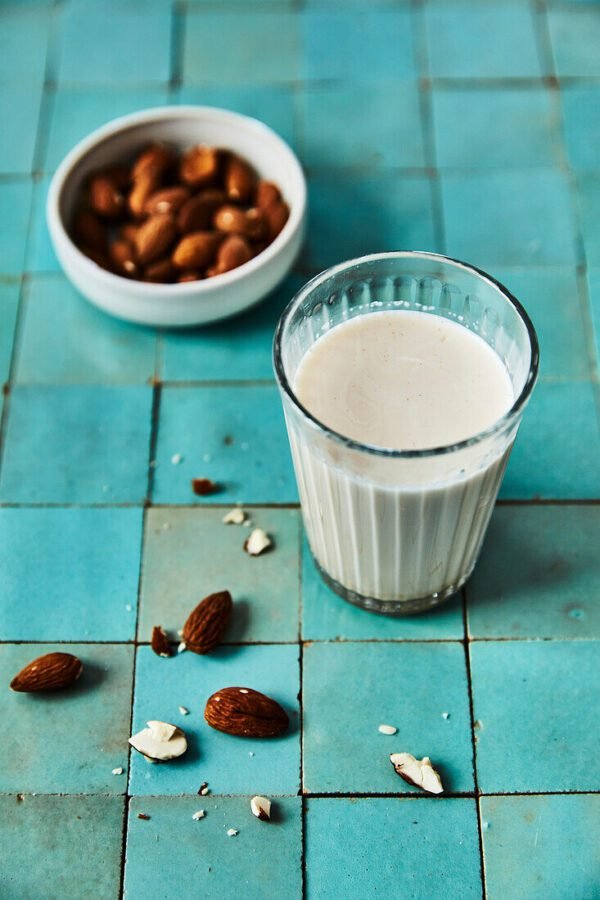What Is Almond Milk?
Almond milk is a popular plant-based drink made from almonds and water. It’s often used as a dairy alternative and is known for its light texture and nutty flavour.
Nutritional Profile
Almond milk is a low-calorie option compared to cow’s milk. A typical cup contains about 30 to 50 calories, depending on whether it’s sweetened or unsweetened. Here’s a quick look at its nutritional benefits:
- Calories: 30-50 per cup
- Protein: 1 gram
- Fat: 2.5 grams (mostly healthy fats)
- Carbohydrates: 1 gram
- Calcium: Often fortified, providing up to 450 mg per cup
It’s also low in sugar if you choose unsweetened varieties. Keep in mind that almond milk offers less protein than cow’s milk, so if you rely on it as a main source of nutrition, consider balance with other protein sources.
Varieties of Almond Milk
You can find almond milk in several types to suit your taste and dietary needs. Here are the main varieties:
- Unsweetened: This version has no added sugar and is great for those watching their sugar intake.
- Sweetened: This adds sugar or sweeteners for a sweeter taste, good for smoothies or cereal.
- Vanilla-flavoured: Often sweetened, this type adds a nice twist for those who enjoy a little extra flavour.
- Chocolate: A treat option that mixes chocolate flavour with almond milk, popular for desserts.
Read labels carefully as some varieties are fortified with vitamins and minerals. Some brands may also add preservatives, so it’s wise to choose a product that meets your preferences.
Shelf Life of Almond Milk
Knowing how long almond milk lasts can save you from wasting it. The shelf life varies depending on whether it’s unopened or opened, so let’s break that down.
Unopened Almond Milk
Unopened almond milk typically lasts for quite a while. Store-bought almond milk in a carton can stay good for 7 to 10 months if you keep it in a cool, dry place. Always check the best-before date on the carton.
Once you open the carton, the clock starts ticking. Unopened almond milk keeps its quality longer than homemade versions, which are best used within 3 to 7 days. If you’re not sure, it’s always a good move to examine it before use.
Opened Almond Milk
Opened almond milk has a shorter shelf life. After you open it, you should consume it within 7 to 10 days. Make sure to place it in the fridge after opening.
Be mindful of how you store it. Keep it tightly sealed, as exposure to air can spoil it faster. Always give it a quick sniff and look for any changes in texture or colour before using it again. If it smells off or has clumps, it’s time to toss it out.
Storage Tips for Almond Milk
Knowing how to store almond milk can help keep it fresh longer. Proper storage ensures you enjoy its taste and benefits without worrying about it going off.
Refrigeration Techniques
After opening, almond milk should be kept in the fridge. Ensure you shake the carton well before pouring, as separation can happen. Store it in the main part of the fridge rather than the door. The door’s temperature can fluctuate more, which isn’t great for keeping your milk fresh.
Seal the carton tightly after each use to avoid contamination. If you transfer it to another container, use glass or food-safe plastic. Always check the best-before date on the carton, too. Once opened, almond milk is best consumed within 7-10 days but always inspect it for any off smells or changes in texture.
Freezing Possibilities
You can freeze almond milk, but the texture may change once thawed. If you decide to freeze it, pour the milk into an airtight container, leaving some space at the top for expansion. Ice cube trays are a good option for small portions.
When you’re ready to use frozen almond milk, move it to the fridge to thaw overnight. Give it a good shake or stir after thawing to help blend any separated bits back together. Note that it’s best used in cooking or smoothies after freezing, as it may not be ideal for drinking straight.
Spoilage Signs
Knowing when almond milk has gone bad can save you from drinking something harmful. Look for changes in appearance and smell. These signs are important to check before you use it.
Visual Indicators
When almond milk spoils, it often shows clear visual signs. First, look for any separation. It’s normal for some separation to happen, but if it looks water-like at the bottom and thick at the top, it might be bad.
Another sign is clumps or a lumpy texture. Fresh almond milk should be smooth. If you see a thick layer floating on top or sediment at the bottom, it could be spoiled.
Check the colour, too. Almond milk should be a light cream colour. If it looks darker and changes to a yellow or grey hue, it may not be safe to drink.
Smell and Taste Test
The smell of almond milk can tell you a lot about its freshness. Fresh almond milk has a subtle, nutty aroma. If you notice a sour or off-smell, it’s a clear sign that it has spoiled.
For a taste test, take a small sip. If the milk tastes sour, or flat, it’s best to throw it away. Fresh almond milk should have a mild, pleasant flavour.
Trust your senses; if something feels off, it’s better to be safe. Don’t risk consuming almond milk that shows signs of spoilage. Always prioritise your health when in doubt.
Also, Read
Health Risks of Expired Almond Milk
Drinking expired almond milk can lead to some health issues. It’s important to pay attention.
Signs of Expired Almond Milk:
- Off Smell: If it smells sour or strange, don’t drink it.
- Strange Texture: Clumps or separation can be a bad sign.
- Change in Colour: Darkening can mean it’s gone bad.
Possible Health Risks:
- Food Poisoning: Bad almond milk can contain harmful bacteria. Symptoms include stomach pain, vomiting, and diarrhoea.
- Allergic Reactions: If you’re allergic to almonds, expired milk can trigger reactions. These can be serious.
- Digestive Issues: Drinking spoiled milk can upset your stomach. You might experience cramps or bloating.
Tips to Avoid Health Risks:
- Check Expiry Dates: Always look at the date before drinking.
- Store Properly: Keep almond milk in a cold, dry place. Once opened, it should go in the fridge.
- Use Within a Week: Opened almond milk usually lasts about 7-10 days. Don’t keep it too long.
If you’re unsure about almond milk, it’s safest to toss it out. Your health should come first.
Almond Milk in Cooking and Baking
Almond milk is a versatile ingredient that can add a unique flavour and texture to your recipes. However, using spoiled almond milk can ruin your dishes, so it’s important to know how spoilage affects your cooking.
Effects of Spoilage on Recipes
When almond milk goes bad, its taste and smell change. Spoiled almond milk can develop a sour or off-flavour that will negatively impact your recipes. If you use it in your baking, for example, cakes or muffins may not rise properly or could taste unpleasant.
Spoilage can also affect the texture of almond milk. You might find it has separated and become lumpy. This can lead to a gritty or undesirable result in smoothies and sauces. Always check the milk before using it. If it smells strange or looks odd, it’s best to toss it. Your dishes will thank you!

